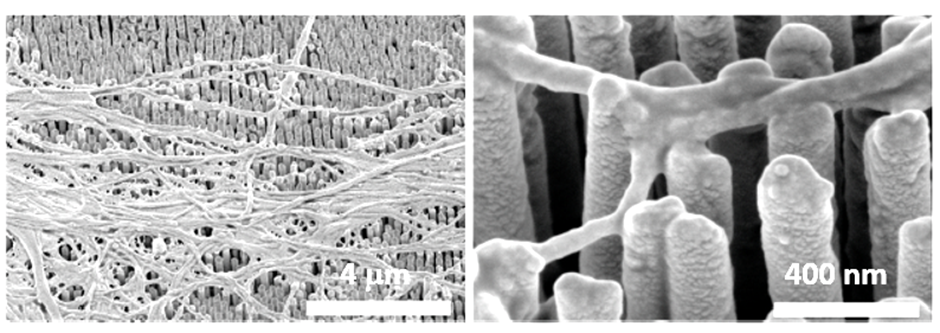Biological response to nanostructured neural interfaces
RESEARCH PROGRAMME
P3: Nanotechnology for healthcare
PhD PROJECT DESCRIPTION
Neural interfaces are bioelectronic devices used in neuromodulation therapies with the capability of stimulating the neural tissue and/or recording the electrical signals generated by that tissue.
Neuromodulation therapies are commonly used to improve neural disabilities. However, the long-term implantation of neural interfaces remains a challenge due to poor biointegration and the potential for chronic inflammation, caused by the mismatch in mechanical properties between the interface and the neural tissue. This discrepancy can result in the formation of fibrotic tissue, ultimately leading to loss of contact between the electrode and the target tissue. Despite significant advances in neural electrode engineering, there are still several obstacles to proper neural tissue interfacing with minimum biological immune response issues and tissue damage.
In this project, we aim to create and test the performance of neural electrodes with improved properties in terms of neural tissue compliance as well as signal transmission. The electrodes will have specially designed nanostructures to produce a favorable biological response promoting neural regeneration behaviors such as enhancing the proliferation and differentiation of stem cells, inducing guided cell migration, and promoting the growth and elongation of neurites.
The project will be developed across the Neural Interfaces Laboratory and the Functional Surfaces Laboratory at IMDEA and in collaboration with Dr Marta P. Pereira from the Center of Molecular Biology “Severo Ochoa” (CBMSO, UAM-CSIC) in Madrid. In addition, the research will be carried out in the framework of a collaborative research line stablished within European projects, which includes international teams as that of Laura Ballerini, SSISA (Italy), Miguel Valencia, FIMA (Spain) or Francesco Battaglia, Stichting Radboud Universiteit (The Netherlands). Within the same framework, we collaborate as well with a company related to the development of neural interfaces, and another focused on preclinical biomedical analysis. It is expected that the researcher will do a secondment in one or more of these groups.
The researcher will be trained on various micro/nanofabrication techniques (Photolithography anodization, electrodeposition, nanoimprinting), cell culturing and electrochemistry characterization. In addition, IMDEA provides a wide Training Programme and activities to broaden researchers’ professional career options, including soft skills as scientific writing, IP training, proposal preparation among others.

Photo from: A. Domínguez-Bajo et al. Biomaterials. 2021, 279, 121186.
APPLICANT’S REQUIREMENTS
The ideal candidate for this position should possess a Master´s degree in biophysics, biotechnology, biomedical engineering or bio-engineering, with a strong background in cell biology.
Having previous experience in culturing neuronal cells, cell differentiation and electrophysiological recordings will be very valuable.
It is expected that the successful candidate will be independent, creative, curiosity-driven and motivated to explore solutions to difficult scientific problems. Additionally, the successful candidate must have a strong work ethics and be proficient in English.
RESEARCH GROUP DESCRIPTION
The neural interfaces laboratory (NIL) at IMDEA is devoted to the development and characterization of nanostructured electrodes and magnetic sensors for the stimulation and recording of neural activity respectively. We aim to produce implantable interfaces that will be less invasive, more precise and more efficient that present ones. NIL is leaded by Dr. M. Teresa González.
The team combines expertise in nanofabrication, electric and electrochemical characterization, noise analysis or nanomagnetism. Through previous and present projects (as the European project ByAxon 737116), NIL has stablished collaborations with other research teams within Spain and other EU countries, which help us in the in-vitro and in-vivo characterization of the biocompatibility and performance of the developed interfaces.
RESEARCH SUPERVISOR
Dr. M Teresa González Pérez
teresa.gonzalez@imdea.org
Research Group website: https://nanociencia.imdea.org/neural-interfaces/home
